What is the UK's plan to send asylum seekers to Rwanda?published at 09:31 BST 13 June 2024
Plans to send some asylum seekers to Rwanda were passed by Parliament, but still face legal challenge.
Read MorePlans to send some asylum seekers to Rwanda were passed by Parliament, but still face legal challenge.
Read MoreSouth Africa legend Allan Donald reveals his years of hurt and torment after his role in the "epic movie" which was the 1999 World Cup semi-final.
Read MoreFor the latest updates, go to bbc.com/africalive
The Afrobeats megastar opens up about the aftermath of his three-year-old son's tragic death
Read MoreEight UN peacekeepers, originally from South Africa, are accused of breaching the organisation's rules.
Read MoreThe nation is gripped by the man said to have won several cases despite not being qualified.
Read MoreEritrean asylum seekers in Israel relocate for a second time following Hamas's surprise attack.
Read MoreAudiences are lapping up televised orchestra performances reviving Somali music for a new generation.
Read MoreThe Confederation of African Football's president says the safety of fans will be 'crucial' to organisers at the 2023 Africa Cup of Nations.
Read MoreA $5bn transport project, funded by Chinese loans, is in danger of becoming a white elephant.
Read MoreSeth Cudjoe recounts his first-time bunker experience in Israel during the "terrifying" emergency sirens of the Hamas attack.
Read MoreWe'll be back on Monday morning
That's all for now from the BBC Africa Live team - we'll be back on Monday morning at bbc.com/africalive.
Until then, you can find the latest updates at BBCAfrica.com and listen to the Focus on Africa podcast for stories behind the news.
A reminder of Friday's wise words:
Quote MessageA loose tooth will not rest until it is pulled out."
An Ethiopian proverb sent by Dibora Elias Kemal in Gauteng, South Africa
And we leave you with this picture of Fridolin Ambongo, the Archbishop of Kinshasa, attending Mass at the Synod of Bishops summit in Vatican City:
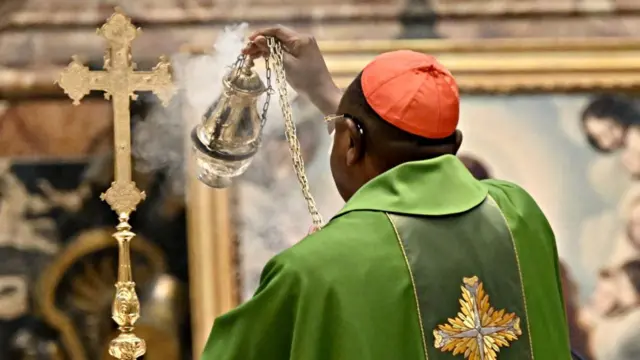 Image source, Getty Images
Image source, Getty ImagesHaruna Ibrahim
BBC Hausa
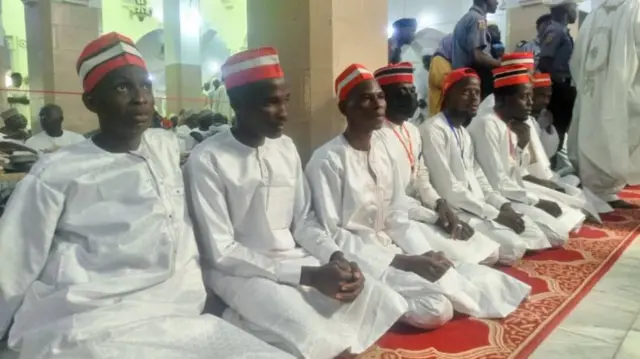
Only the grooms were at the ceremony
A mass wedding has been held in Nigeria's northern Kano state for 1,500 women.
The Kano state administration said it had sponsored the marriage of widows and new brides to support them in building the foundation of family life and improving social affairs.
The brides were not present at the wedding, only the grooms.
The wedding was among the top campaign promises of the governor who was voted into office earlier this year.
For years such a wedding was an annual event, but it was halted by the previous state government.
Kano is the second-largest city in Nigeria and the commercial hub of the northern part of the country.
Marco Oriunto
BBC Focus on Africa radio
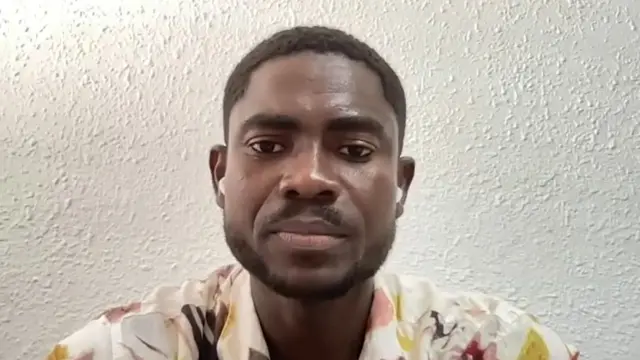
Seth Cudjoe sought shelter with his family when Hamas attacked on Saturday
A Ghanaian man living in the Israeli city of Tel Aviv has described attending a “memory day” for the victims of Hamas' attack on Saturday.
Seth Cudjoe, a professional living in the suburb of Yehuda, said people in his neighbourhood lit candles in the shape of the Star of David on Thursday.
“They were led by Rabbis who told them to pray,” said Mr Cudjoe.
Many children joined the vigil with “colourful songs and dance, in remembrance of all those who lost their lives” during the attack, he said.
Mr Cudjoe, an irrigation technician living in Israel with his wife and a four-month old daughter, recalled the “terrifying moment” the sirens went off on Saturday.
“I was scared because it was my first time in a bunker,” says Mr Cudjoe, who in the early hours of Saturday sought shelter with his family as sirens went off.
“You could hear the sound of rockets being intercepted by the Iron Dome,” remembers Mr Cudjoe, “but when there was a blast you could feel the vibrations”.
Palestinian militants killed more than 1,300 people in Israel at the weekend and kidnapped at least 150.
More than 1,500 people have died in Gaza, an area in the Palestinian territories, since Israel launched retaliatory air strikes.
 DJ Edu
DJ Edu
Presenter of This Is Africa on BBC World Service
 Image source, Sant’Anna Wilfried
Image source, Sant’Anna WilfriedRoseline Layo has taken Ivory Coast by storm this year.
In June, her first album, Elu de Dieu, was certified gold and yet she only dropped her first single, Donnez Nous un Peu, in December 2021.
It looks like a meteoric rise, but Layo has been harbouring this dream for a while. She was learning to be a dressmaker to help support her family, but decided to enter a local TV talent contest.
She didn’t win, but it lit a flame inside her and she continued to look for opportunities and make connections. Now, everywhere, Ivorians are dancing to her tunes. Her fans feel she comes across as down to earth - someone the ordinary person on the street can identify with.
Layo’s most recent hit, Mogo Fariman, is reminiscent of a traditional praise song, at least in its lyrical content:
She told the BBC: "Mogo Fariman is Malinke [a West African language]. It means ‘the great man’.
"We wanted to value our fathers, the people who help us, the people who support us, that’s why we sing: ‘The baobab arrives, the head of the family arrives, the big man arrives, the president arrives, the king makes his entrance'."
Layo is keen to emphasise her versatility - she said she doesn't only perform zouglou, a popular Ivorian genre.
"People would like to label me as a zouglou girl but it is not the case at all. I do a big variety. I do everything. You can give me reggae, I’ll do it. You can give me rap, I’ll do it," she said.
After the TV talent contest in 2014, Layo joined Bella Mondo, Ivory Coast’s first all-female band: "That’s where I learnt how to perform on stage, how to speak to an audience, how to hold a microphone.
"I would say that’s where my training really started. Then I continued working as a piano bar artist and I learned all about live music, I learned a lot, and that’s when I said to myself: 'Roseline, go for it, you are ready.'"
She released Donnez Nous un Peu (which means ‘Give Us a Little Bit’) and it has now racked up 26 million views on YouTube. It seems the preparation paid off. But what does Layo put her success down to?
"It’s thanks to God and work, because we work all the time. And you have to love the job you do, put your heart into it, and when you do it, it can only bear this kind of fruit. We don’t sleep much!"
You can hear the interview with Roseline Layo on This Is Africa on BBC World Service radio this weekend.
Bushra Mohamed
BBC News
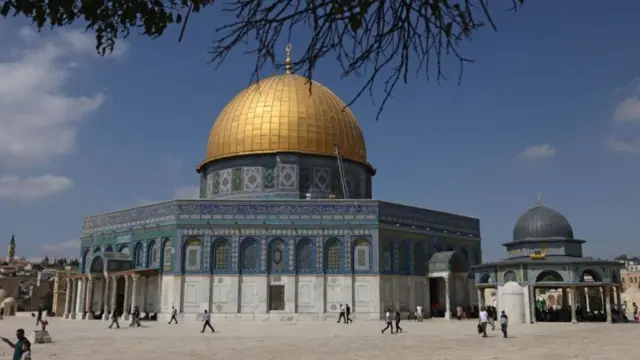 Image source, AFP
Image source, AFPAn Afro-Palestinian community lives near the al-Aqsa Mosque, the third holiest site in Islam
Palestinians of African descent who live near Jerusalem’s al-Aqsa Mosque have told the BBC they are being harassed by Israeli police following Saturday’s deadly assault by Hamas militants on Israeli communities around the Gaza Strip.
Mousa Qous, head of the African Community Society in Jerusalem, said he knew of Afro-Palestinians who had been beaten and humiliated and a 13-year-old who was arrested for several hours.
Mr Qous told the BBC this week that few people from his community are going out as they fear harassment and arrest.
“My nephew went out today to buy some stuff from the shop, but Israeli police stopped him to search. When they searched him in a humiliating way and he protested, they beat him," he said.
“We live just opposite the entrance of al-Aqsa Mosque, Israel police stopped us from getting into the mosque for prayer and we are subjected to harassment and abuse.”
The Palestinians of African descent predominately come from Chad, Nigeria, Senegal and Sudan and have been living in Jerusalem for centuries.
The BBC has contacted the police in Israel for a comment but has not yet received a response.
Andrew Ochieng
BBC World Service newsroom
A man reported to have won several court cases in Kenya has been practising without qualifications, legal officials have said.
The man identified as Brian Mwenda has appeared in televised court proceedings.
The Law Society of Kenya (LSK) accuses Mr Mwenda of impersonating a lawyer with a similar name, by taking over his profile on the LSK portal.
It has asked the police to arrest Mr Mwenda, who has not yet commented on the allegations.
 Nicolas Négoce
Nicolas Négoce
BBC News, Dakar
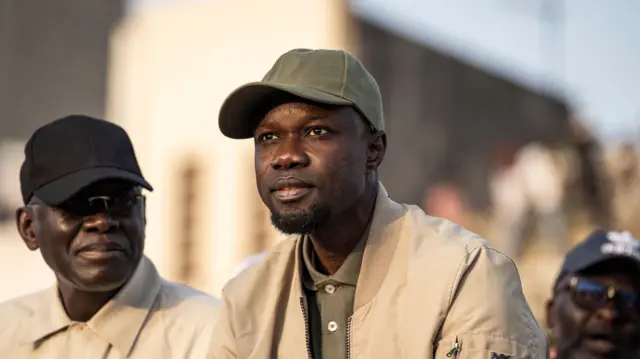 Image source, AFP
Image source, AFPOusmane Sonko (right) rose to prominence in the 2019 presidential election
After a court hearing on Thursday, a judge ordered that jailed Senegalese opposition leader Ousmane Sonko be reinstated on the electoral roll.
Mr Sonko's name was struck off the list of those eligible to vote after he was handed a two-year jail sentence in August.
He was found to have acted immorally towards an individual younger than 21, but denied the allegation, arguing that the case was politically motivated.
Mr Sonko's lawyers said the judge's decision on Thursday paved the way for him to run in next February's presidential elections. However, this has not been confirmed.
In a press release published on Friday, government lawyers said they would appeal against the ruling.
The court hearing took place in Ziguinchor, the southern city where Mr Sonko was on the voters' roll, and where he is mayor.
His sentence for "corrupting the youth" sparked violent protests in one of Africa's most stable nations. At least 16 people died and hundreds were injured, according to officials.
In late July, the opposition leader was imprisoned on fresh charges: calling for an insurrection, criminal conspiracy in connection with a terrorist enterprise and endangering state security.
A former civil servant, Mr Sonko rose to prominence in the 2019 presidential election, in which he came third.
Two years after reaching the quarter-finals on debut, The Gambia will face a perilously tough task in January at the Africa Cup of Nations.
Read More BBC Monitoring
BBC Monitoring
The world through its media
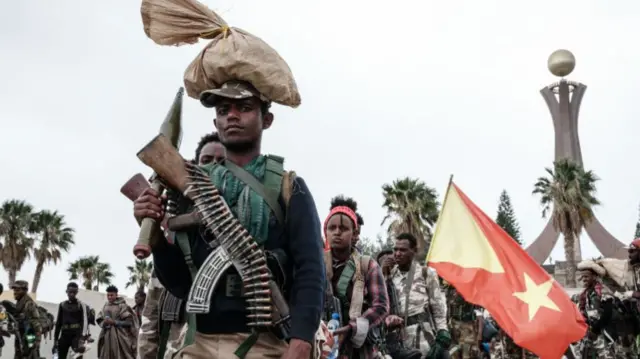 Image source, AFP
Image source, AFPThe two-year war in Tigray ended last November in a deal brokered by the African Union
The Ethiopian government has dismissed as "irresponsible and reckless" a statement by the UN's special adviser on the prevention of genocide.
Alice Wairimu Nderitu had warned in a statement on Tuesday about a "heightened risk of genocide" in Ethiopia.
"The government of Ethiopia regrets that the UN [adviser] released an irresponsible and reckless statement on the situation in Ethiopia," Ethiopia's Ministry of Foreign Affairs has posted on Facebook in response.
"The special adviser relied on the International Commission of Human Rights Experts on Ethiopia [ICHREE] to make inflammatory statement against Ethiopia," it added.
ICHREE was set up by the UN Human Rights Council in 2021 to investigate allegations of violations committed in Ethiopia's northern Tigray region. Its report in September documented crimes committed by all sides during the two-year conflict, which ended last November.
A subsequent report warned that "serious violations" continued in Tigray and in other Ethiopian regions.
Global human rights organisations had wanted ICHREE to continue and broaden its investigations, but the deadline to extend its mandate expired last week.